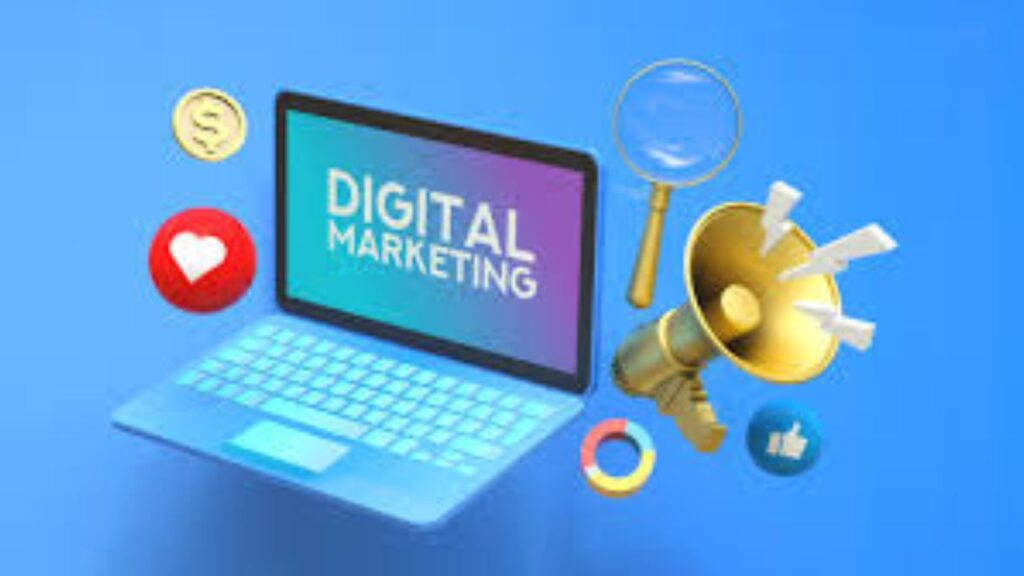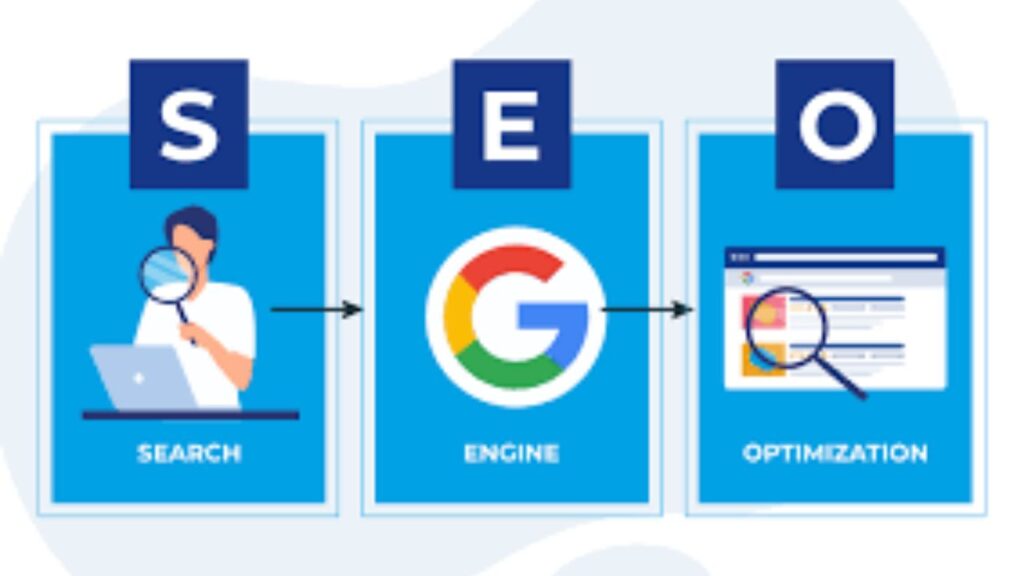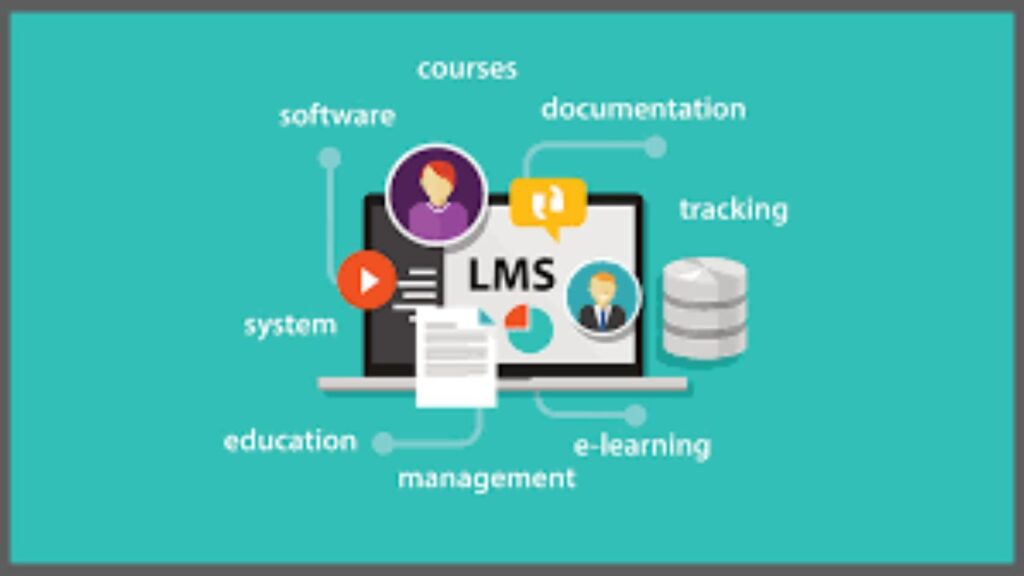Table of Contents
ToggleDoes Digital Marketing Work For All Businesses
Does Digital Marketing work for all Businesses. Digital marketing can be effective for a wide range of businesses, but its success depends on various factors such as the industry, target audience, and the specific strategies employed.
It is not right to say that digital marketing is effective for all businesses. There are only a few businesses for which it is effective but it is not effective for all businesses. In this blog today we will know for which businesses digital marketing is effective, stay with us till the end
What is Digital Marketing?
Digital marketing is the components of marketing that uses the components of marketing that uses the internet and online based digital technologies such as desktop computers, mobiles phones and other digital media and platforms to promote products and services.
The COVID- 19 pandemic has accelerated the shift to online banking, retail education and telehealth and these trends aren’t going away. The global digital marketing market size was valued at USD 43.8 billion in 2019.
Digital marketing refers to the use of digital channels, platforms, and technologies to promote products, services, or brands to a targeted audience.
It encompasses a wide range of strategies and tactics, including search engine optimization (SEO), content marketing, social media marketing, email marketing, pay-per-click (PPC) advertising, and more.
The goal of digital marketing is to reach consumers where they spend much of their time—online—through websites, social media, search engines, and email.

Types Of Digital Marketing
1. Search Engine Optimization (SEO)
Search Engine Optimization (SEO) is the process of optimizing a website to enhance its visibility and ranking on search engine results pages (SERPs).
This is achieved through various strategies, including keyword research to identify terms potential customers are searching for, on-page optimization to ensure content and HTML elements align with these keywords, and off-page optimization such as acquiring backlinks from reputable sites.
Search Engine Optimization. The goal of SEO is to get a business to rank higher in Google search results, ultimately increasing search engine traffic to the business website. To accomplish this SEO marketers research words and phrases consumers are using to search for information online anduse those terms in their own content.

2. Content Marketing
Content marketing is a strategic approach focused on creating and distributing valuable, relevant, and consistent content to attract and engage a clearly defined audience.
Unlike traditional advertising, content marketing aims to provide informative and educational material that addresses the needs and interests of potential customers. This can include blog posts, videos, infographics, eBooks, podcasts, and social media updates.
By delivering high-quality content, businesses can build trust and authority in their industry, foster stronger relationships with their audience, and ultimately drive profitable customer actions.
Effective content marketing not only enhances brand awareness but also improves search engine rankings, generates leads, and nurtures customer loyalty by continually providing value beyond the initial sale.

3. Social Media Marketing
Social media marketing involves leveraging social media platforms to promote products, services, or brands and engage with a target audience.
This marketing strategy utilizes various social media channels like Facebook, Instagram, Twitter, LinkedIn, and TikTok to create and share content, run paid advertising campaigns, and interact directly with followers.
By using a mix of organic posts, stories, videos, and ads, businesses can reach a wider audience, foster community engagement, and drive traffic to their websites.
Social media marketing helps build brand awareness, humanize the brand, and provide customer support in real-time. It also allows for precise targeting and analytics, enabling marketers to tailor their strategies and measure the effectiveness of their campaigns.

4. Pay-Per-Click (PPC) Advertising
Pay-Per-Click (PPC) advertising is a digital marketing model where advertisers pay a fee each time their ad is clicked, driving traffic to their websites. This approach allows businesses to buy visits rather than relying solely on organic traffic.
PPC ads can appear on search engines like Google and Bing, as well as on social media platforms like Facebook, Instagram, and LinkedIn. Advertisers bid on keywords relevant to their target audience, and their ads are displayed when users search for those terms.
The effectiveness of PPC advertising lies in its ability to target specific demographics, locations, and interests, ensuring that ads reach the most relevant audience. With real-time tracking and analytics, businesses can monitor the performance of their campaigns, adjust strategies, and optimize their budget for maximum return on investment.

5. Email Marketing
Email marketing is a powerful digital marketing strategy that involves sending targeted emails to a group of recipients to promote products, services, or engage with customers. This approach is highly effective for nurturing leads, building customer relationships, and driving sales.
Email marketing campaigns can include newsletters, promotional offers, personalized messages, and automated sequences tailored to the recipients’ interests and behaviors. By segmenting the email list based on demographics, purchase history, and engagement levels, businesses can deliver relevant content that resonates with each audience segment.
The success of email marketing lies in its ability to deliver timely, personalized, and actionable content directly to the inboxes of potential and existing customers.

6. Affiliate Marketing
Affiliate marketing is a performance-based marketing strategy where businesses partner with individuals or other companies (affiliates) to promote their products or services.
Affiliates earn a commission for each sale, lead, or action generated through their promotional efforts, typically tracked via unique affiliate links. This marketing approach leverages the influence and reach of affiliates, who may use various channels such as blogs, social media, email campaigns, or websites to promote the business.
For businesses, affiliate marketing is a cost-effective way to expand their reach and drive conversions, as they only pay for actual results. Affiliates benefit by earning passive income from their marketing efforts.

7. Influencer Marketing
Influencer marketing is a strategic collaboration between businesses and individuals (influencers) who have a dedicated and engaged following on social media platforms or other digital channels.
These influencers have built credibility and trust with their audience, making them effective advocates for brands seeking to reach specific demographics or niche markets.
Influencer marketing campaigns often involve sponsored content, where influencers promote products or services through posts, videos, reviews, or endorsements that align with their personal brand and audience interests.

Which Businesses is Digital Marketing Effective
It is not right to say that digital marketing is effective for all businesses. There are only a few businesses for which it is effective. We will know about them in detail later. Stay with us till the end.
1. E-commerce Businesses
E-commerce businesses operate entirely online, selling products and services directly to consumers through digital platforms. Digital marketing plays a crucial role in their success by driving traffic to their websites, increasing visibility on search engines, and engaging customers through various channels.
Strategies like search engine optimization (SEO) ensure that their products rank well in search results, while pay-per-click (PPC) advertising allows for targeted campaigns to attract potential buyers.
Content marketing through blogs, product descriptions, and reviews helps educate and persuade customers, while social media marketing enables e-commerce businesses to connect with their audience, showcase products, and run promotional campaigns.
Email marketing further nurtures customer relationships and encourages repeat purchases through personalized offers and updates. For e-commerce businesses, leveraging these digital marketing strategies effectively can lead to increased sales, brand loyalty, and sustained growth in the competitive online marketplace.

2. Technology Companies
Technology companies leverage digital marketing strategies to effectively reach their target audiences and drive growth in competitive markets. SEO plays a critical role in ensuring their products and services are discoverable through organic search results, enhancing visibility and credibility.
Content marketing is essential for educating potential customers about complex solutions and establishing thought leadership through blogs, whitepapers, and case studies.
Social media marketing allows technology companies to engage directly with their audience, share updates, and showcase innovations. PPC advertising enables precise targeting of prospects actively searching for tech solutions, driving immediate traffic and conversions.
Email marketing plays a role in nurturing leads and maintaining ongoing communication with customers, promoting new features or updates. Technology companies also utilize influencer marketing to leverage industry experts or tech influencers who endorse their products, building trust and credibility within the tech community.

3. Professional Services
Professional services firms, such as law firms, consulting agencies, financial advisors, and real estate agents, rely heavily on digital marketing to attract and retain clients in competitive markets.
SEO is crucial for ensuring their services appear prominently in search engine results, as potential clients often begin their search online. Content marketing plays a significant role in establishing expertise and trustworthiness, with firms publishing blogs, articles, and whitepapers that address client concerns and showcase industry knowledge.
Social media platforms like LinkedIn are utilized for networking, sharing insights, and building professional relationships, while PPC advertising enables targeted campaigns to capture leads actively seeking specific services.
Email marketing campaigns are tailored to nurture relationships with prospects and provide valuable updates or insights. Online reviews and reputation management are also vital, as potential clients often rely on peer recommendations and testimonials when selecting professional services.

4. Local Businesses
Local businesses, such as restaurants, retail stores, salons, and service providers, benefit significantly from digital marketing strategies tailored to their geographical area.
Local SEO is crucial for these businesses, optimizing their online presence to appear in local search results and on map listings like Google My Business. This ensures they are visible to potential customers searching for nearby products or services.
Social media marketing plays a vital role in engaging with the local community, sharing updates, promotions, and customer testimonials to build relationships and encourage repeat business. Paid advertising on platforms like Google Ads or Facebook Ads allows local businesses to target specific demographics and locations, driving foot traffic or website visits.
Reputation management is essential, as positive online reviews and testimonials can significantly influence local consumers’ decisions. Email marketing campaigns can also be localized to promote special offers, events, or loyalty programs to a targeted audience.

5. Healthcare Providers
Healthcare providers, including doctors, dentists, chiropractors, and wellness centers, utilize digital marketing strategies to effectively reach and engage with patients in today’s digital age.
SEO is critical for healthcare providers to ensure their practices appear prominently in search engine results when patients search for relevant medical services or treatments. Content marketing plays a significant role in educating patients about health conditions, treatments, and preventive care through informative blogs, articles, and patient resources.
Social media platforms such as Facebook, Instagram, and LinkedIn are used to engage with patients, share health tips, promote services, and provide updates about the practice. PPC advertising enables healthcare providers to target specific demographics or geographical areas, attracting new patients actively seeking medical services.
Email marketing campaigns are utilized for patient education, appointment reminders, and health-related newsletters to maintain communication and build patient loyalty. Online reputation management is crucial, as positive reviews and patient testimonials can influence potential patients’ decisions.

6. Education and Training
Education and training institutions, including online courses, tutoring services, and traditional educational providers, rely on digital marketing strategies to attract students, build brand awareness, and enhance engagement.
SEO is essential for these institutions to rank well in search engine results for relevant educational programs and services. Content marketing plays a pivotal role in showcasing expertise and attracting prospective students through informative blogs, videos, webinars, and downloadable resources.
Social media platforms such as Facebook, Instagram, and YouTube are utilized to engage with students, share educational content, highlight success stories, and promote courses or programs. Paid advertising campaigns on search engines and social media channels enable educational institutions to target specific demographics, geographic locations, and interests, driving enrollment and registrations.
Email marketing is effective for nurturing leads, providing course updates, and sending personalized communications to prospective and current students. Online reviews and testimonials also play a crucial role in building credibility and influencing potential students’ decisions.

7. Entertainment and Media
Entertainment and media companies leverage digital marketing strategies to engage audiences, promote content, and build loyal fan bases in today’s competitive landscape. SEO is crucial for ensuring that their content, whether articles, videos, or podcasts, ranks well in search engine results, driving organic traffic and increasing visibility.
Content marketing plays a central role in creating compelling narratives, engaging stories, and entertaining content that resonates with their target audience across various platforms. Social media platforms such as Facebook, Instagram, Twitter, and TikTok are utilized to share updates, interact with fans, promote new releases, and generate buzz around upcoming events or shows.
Paid advertising campaigns on social media and streaming platforms enable entertainment companies to target specific demographics, geographic regions, and interests, boosting viewership and engagement. Influencer marketing plays a significant role in reaching niche audiences and leveraging the influence of social media personalities or content creators to endorse content or events.
Email marketing campaigns are also effective for keeping fans informed about new releases, exclusive content, and upcoming events, fostering a direct connection with their audience.

8. Travel and Hospitality
The travel and hospitality industry relies heavily on digital marketing strategies to attract travelers, increase bookings, and enhance guest experiences.
Search engine optimization (SEO) is critical for ensuring that hotels, airlines, tour operators, and travel agencies appear prominently in search engine results when travelers search for accommodations, flights, or vacation destinations.
Content marketing plays a pivotal role in inspiring and informing travelers through engaging blogs, destination guides, travel tips, and immersive videos that showcase unique experiences and attractions. Social media platforms such as Instagram, Facebook, and Pinterest are utilized to showcase stunning visuals, share customer testimonials, promote special offers, and engage with travelers in real-time.
Paid advertising campaigns on search engines and social media channels allow travel businesses to target specific demographics, interests, and geographic locations, driving traffic to their websites and increasing bookings.
Email marketing campaigns are effective for nurturing customer relationships, sending personalized travel recommendations, and providing exclusive deals or loyalty rewards to past guests.

9. Non-Profit Organizations
Non-profit organizations utilize digital marketing strategies to raise awareness, engage supporters, and drive donations for their causes. Search engine optimization (SEO) is essential for non-profits to ensure their websites rank well in search engine results, making it easier for people interested in their cause to find relevant information and get involved.
Content marketing plays a crucial role in educating the public about the organization’s mission, impact stories, and ongoing initiatives through blog posts, articles, infographics, and videos that inspire empathy and action.
Social media platforms such as Facebook, Twitter, and LinkedIn are utilized to amplify their message, share success stories, connect with supporters, and mobilize communities around fundraising campaigns or advocacy efforts.
Paid advertising campaigns on social media and search engines enable non-profits to target specific demographics, promote events, and drive traffic to donation pages or volunteer sign-ups. Email marketing campaigns are effective for maintaining relationships with supporters, sending newsletters, updates on projects, and personalized donation appeals.

10. Fashion and Beauty
Fashion and beauty brands leverage digital marketing strategies to engage with their audience, drive sales, and build brand loyalty in a competitive industry.
Search engine optimization (SEO) is crucial for ensuring that their products and content rank well in search engine results pages (SERPs), making it easier for potential customers to discover their latest collections and trends. Content marketing plays a pivotal role in creating aspirational and informative content through blogs, style guides, tutorials, and behind-the-scenes videos that resonate with fashion-forward consumers.
Social media platforms such as Instagram, YouTube, and TikTok are essential for fashion and beauty brands to showcase their products, collaborate with influencers, engage with followers through visually appealing content, and promote new launches or seasonal campaigns.
Paid advertising campaigns on social media channels allow brands to target specific demographics, interests, and geographic locations, driving traffic to e-commerce websites and increasing sales during key promotional periods.
Influencer marketing is prevalent in the industry, with brands partnering with fashion influencers and beauty experts to reach niche audiences, gain credibility, and generate buzz around products through authentic endorsements and collaborations.
Email marketing campaigns are effective for nurturing customer relationships, sending personalized style recommendations, and announcing exclusive offers or VIP events to loyal customers.

Conclusion
Digital marketing encompasses a diverse range of strategies and tactics that businesses across various industries utilize to achieve their marketing goals in today’s digital landscape.
From search engine optimization (SEO) and content marketing to social media engagement, paid advertising, and influencer partnerships, each strategy plays a crucial role in enhancing visibility, engaging with target audiences, and driving conversions.
Whether it’s e-commerce businesses increasing online sales, healthcare providers improving patient outreach, or non-profit organizations raising awareness for important causes, effective digital marketing allows organizations to reach and connect with their audiences in meaningful ways.
If you also want to learn digital then hello my name is Rozy I teach digital marketing in Hindi. If you also want to learn digital marketing then click on the link given below and register for my webinar.
